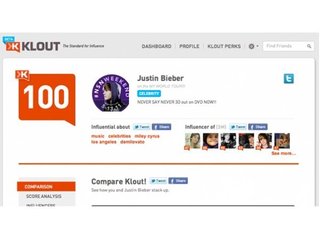The FDA outlines draft guidance on AI for medical devices
The agency also published draft guidance on the use of AI in drug development
Read more...
Just weeks after securing a substantial $30 million round of capital, the social influence index Klout has acquired a neighborhood interaction application called Blockboard.
The San Francisco startup, Klout uses the interactions that people and brands have on social networks such as Twitter, Facebook, Foursquare and YouTube to let them know how effective they are in communicating on certain topics and helps brands connect with the best influencers in their vertical.
The terms of the acquisition were not publicly disclosed but it does appear to be a way to boost the company's ability to get more localized information and sharing since Blockboard's focus is on the neighborhood level.
The Blockboard app allows people in a given neighborhood to share information about crime, events, asks questions and report issues such as potholes and graffiti directly to city officials.
Blockboard raised a $1 million in seed funding in 2010 from Schachter, Mitch Kapor, the Founder Collective, Battery Ventures, Harrison Metal, Josh Stylman, Tom McInerney, and David Liu and was created by founders: Dave Baggeroer, Stephen Hood and Josh Whiting.
In a blog post Tuesday, Klout founder and CEO Joe Fernandez explained that the Blockboard technology will be pivotal to help mobilize and localize the content for the service -- especially since the company has yet to come out with a mobile application.
"To keep driving toward our mission of unlocking every user’s influence, we need to make Klout useful and accessible wherever they are – whether they’re at home or on the go," Fernandez wrote. "Blockboard has built an amazing local-mobile app that connects neighbors to build stronger communities through technology."
Unlike some Twitter acquisitions, Klout said that Blockboard’s app would continue to be available.
Both San Francisco companies have gained great traction in their native cities, but Klout has been able to grow nationally and connect with big brand names to garner all the recent funding it has -- now Blockboard has the opportunity to get a infusion of cash to grow its neighborhood communication system.
“If you’ve been following Blockboard (or using it in San Francisco), you know that we’re all about using technology to connect neighbors and build stronger neighborhoods,” Blockboard explained in a blog post on its sale. “Along the way we’ve learned a lot about how local communities work, including the fact that people often rely on influence to build relationships with those around them.”
Since both companies are so very different in their focus and application, it is challenging to see the connection, but once you factor in just how many more partners and topics Klout can capitalize on with a localizing and mobile application it is easier to see why Klout made the choice to bring Blockboard into its company.
All of this was made possible because last month Klout, added $30 million to its previous $8.5 and $1.5 million funding rounds.
The buzz about the $30 million was that it would be primarily focused on mobile, and so this purchase looks like the first step in that direction.
Klout, founded in 2008, gained a lot of recognition and steam in 2011 for its marketing and social media service that offers perks and other freebies for people that have shown social influence in particular areas of interest.
Back in October, Klout was ruffling some feathers when it messed with the algorithm that determine how much Klout a person has (by looking at the number of interactions and follows that an entity has on FourSquare, Twitter, LinkedIn, Facebook and other sites.)
Some of the changes to the algorithm and the way a users sees their score are interesting because rather than just seeing your score and the top people you influence, you can now see what people are no longer engaged by your activity. Essentially, now I can obsess about what I did to make these profiles lose interest -- enter obsessive ex-girlfriend cliche of your choice.
Fernandez told me that he created this company to give people some feedback in an area where a lot of newcomers were putting in energy without knowing how effective they were being.
If the $30 million Series estimate is accurate, this would put the company's valuation in the $200 million ballpark and poise the company for greater growth in 2012.
While the company does not disclose its revenue or complete revenue model publicly, they do show some potential since they are able to provide brands and marketing campaigns a method of reaching the most influential people in different fields.
Companies such as Audi or Toyota, for example, could reach out to people with Klout scores above 70 in the areas of cars and luxury to offer them test driving time with their latest models -- and essentially hope that they tweet, blog, Tumblr, etc. about their experience.
The next move expected by Klout is visible mobile strategy -- since it currently doesn't even have a mobile application -- and more opportunities than just the Klout Perks.
The agency also published draft guidance on the use of AI in drug development
Read more...The biggest focus areas for AI investing are healthcare and biotech
Read more...It will complete and submit forms, and integrate with state benefit systems
Read more...



